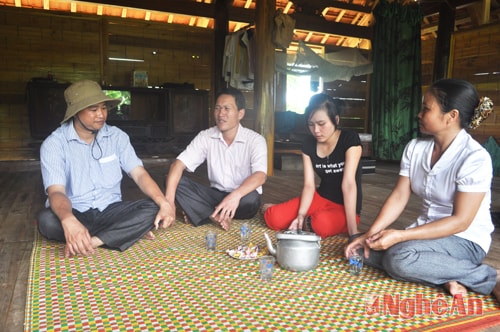Promoting the role of grassroots mediation
(Baonghean) - Grassroots mediation activities play an important role in resolving conflicts that exist in each family, alley, village, etc. In particular, since January 1, 2014, the Law on Grassroots Mediation has taken effect, creating a solid legal corridor for this activity.
Participating in the mediation session with the Women's Union of Thach Ngan Commune (Con Cuong) in Ke Gia village, we can see the hard work of those who are considered "the jailers and the whole village". It is known that before conducting the mediation session, the members of the group had to spend weeks to grasp the cause of the conflict in Mr. K's family, which was because he often drank alcohol. And right at the mediation session, the members used their life experiences to analyze and advise Mr. K that "drinking alcohol not only affects health and causes economic loss, but also causes loss of self-control, and has words and actions that insult his wife and children"; "drinking too much alcohol will sooner or later lead to illness, at that time not only will you suffer, but your wife and children will also lose support, what will family life be like?...".
After 2 hours, the reasonable analysis of the team members made Mr. K understand. He was moved and said: “Because I often drink alcohol, I often quarrel with my wife and children. There were times when I could not control my behavior and beat my wife to the point of having to be hospitalized. Many times my wife had to leave me... Now that the mediation team has analyzed me, I have realized the harmful effects of alcohol. I truly regret it. Therefore, I promise to quit drinking from now on and work hard to make my wife and children suffer less...”.
 |
| Lam Khe village mediation team, Chi Khe commune (Con Cuong) learned about the reality in the area. |
Excited by the successful reconciliation of the long-standing conflict in Mr. K's family, Ms. Ha Thi Phan, President of the Women's Union of Thach Ngan commune, said: It is one of the hot spots of domestic violence in Con Cuong district. Therefore, in addition to propagating to help women know how to prevent violent acts, the Women's Union regularly coordinates with mass organizations to organize reconciliation activities. Through this form, many acts of violence have been condemned, many families have found peace again, and most of all, the burdens of women's lives have been reduced. In addition, through the form of reconciliation, many complicated problems and conflicts within the masses have also been resolved promptly, thanks to which the village and neighborhood relationships have been maintained.
In conjunction with reconciliation activities, from 2009 to present, in Trong village, Nghia Tho commune (Nghia Dan), the model of "Women helping each other to eliminate hunger and reduce poverty, fight against crimes of trafficking of women and children" has also been built. Ms. Truong Thi Mai, a local resident, said: Combining reconciliation with activities to help each other eliminate hunger and reduce poverty makes the reconciliation results more sustainable. Because many families have conflicts due to poverty due to unemployment and unstable income. After being reconciled and supported to develop the economy, the family is not only in harmony, but also feels secure in production.
According to statistics, the whole province currently has 5,829 mediation teams (out of a total of 5,370 blocks, villages, hamlets, and hamlets), with 37,171 mediators. Of these, 1,499 mediators have university degrees, 722 mediators have college degrees, 18,149 mediators have high school degrees... The organization of the mediation teams basically has all the participating members such as: Party cell secretaries, hamlet chiefs, women's unions, farmers' unions, veterans' unions, youth unions and other members of the Front, along with a number of inter-family groups including village elders, religious dignitaries, experienced people, and highly prestigious people in the community. With the understanding of the law, enthusiasm, dedication and efforts of the mediators, the mediation work in the whole province has achieved many results. Many cases of petitions and disputes that have lasted for a long time have been mobilized and analyzed thoroughly by the grassroots mediation teams, so that no complicated conflicts have occurred. In 2013 alone, the mediation teams received 7,689 cases and successfully mediated 5,827 cases, accounting for over 75.78%.
According to the assessment of Mr. Duong Huu Dung, Deputy Director of the Department of Justice: Mediation work in recent years has contributed to directly resolving violations of the law in the fields of civil, family, land, administration, etc.; contributing to limiting petitions and complaints beyond the level. People have resolved their conflicts by negotiation and agreement that are both reasonable and reasonable without having to seek intervention from competent authorities. Mediation work also has the effect of disseminating and educating the law, raising awareness of law compliance and maintaining social order, contributing to promoting socio-economic development, and strengthening solidarity among the people.
Article and photos:Quang An
| Article 9, Chapter II of the Law on Mediation at the Grassroots level stipulates that mediators are entitled to remuneration based on the case or work when conducting mediation. This will be a factor promoting the effectiveness of mediation activities at the grassroots level. Therefore, the People's Committees at the district and commune levels need to pay attention and proactively arrange reasonable funding and facilities, and stabilize mediation work in accordance with the spirit of the Law on Mediation at the Grassroots level and current regulations. At the same time, mobilize resources to support additional funding to encourage mediation teams at the grassroots level, and give reasonable rewards to collectives and individuals with outstanding achievements in the process of performing their tasks, so that mediation work can fully promote its role in maintaining and strengthening solidarity among the people, contributing to building security and order in each locality. |






